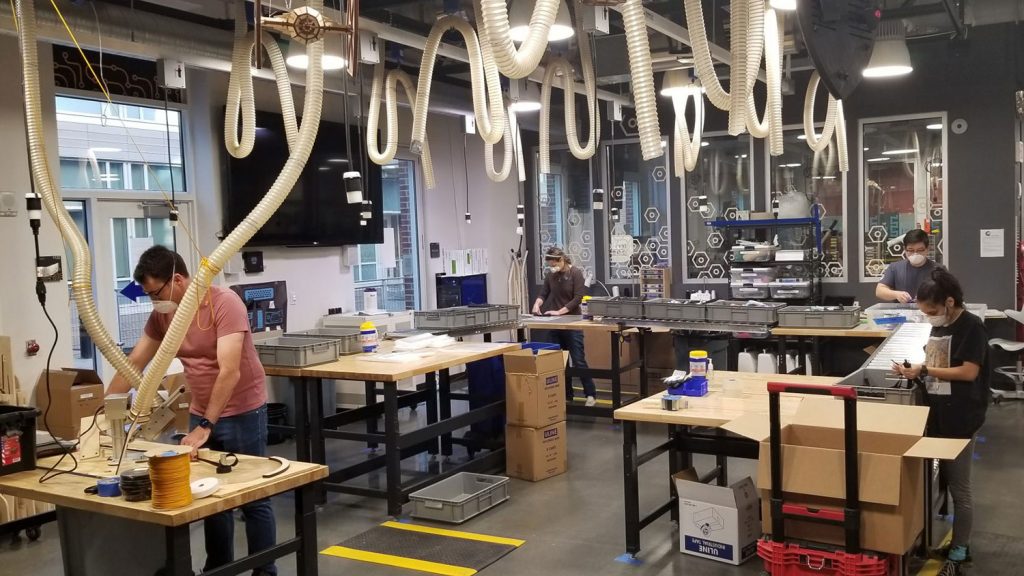By Isabel Fróes
As Bowie almost made a prediction when he sang in his lyrics from 1981: ‘It’s the terror of knowing what this world is about/Watching some good friends screaming “Let me out!”/’, 2020 proved to be a year of challenges, which however took us to higher grounds of learning and collaboration in many unexpected ways.
The sudden changes and lockdowns across the world led by Covid-19 sparked many initiatives and innovation in various fields. As presented in a previous blog post, it created opportunities for urban spaces to be rethought, experimenting with expanding and further developing various mobility formats.
Beyond urban spaces, the pandemic also became a fuel to push initiatives in other fronts, such as social and local manufacturing.
Makerspaces and local production initiatives were well described in a recent blog post by my colleague Efthymios Altsitsiadis. During the pandemic, makerspaces became more than a niche, through shared content and distributed leadership, these spaces became relevant production resources. Makers collaborated and engaged in locally producing personal protective equipment (PPE), helping cities and countries better cope with the shortages and international supply chain issues during the first lockdown.
CBS has followed this process closely as it is currently a partner in the EU-funded iPRODUCE project. The project started in January 2020 focusing on developing a novel social manufacturing platform that embraces manufacturing companies in the consumer goods sector. In short, the project is committed to bringing closer manufacturers, makers and consumer communities (MMCs) at the local level; to engage them into joint co-creation challenges for the manufacturing of new consumer products and the introduction of novel engineering and production (eco)systems; to fuse practices, methods and tools that both makers and manufacturing companies (SMEs specifically) are employing.
The project, as an innovation action (IA), has formed clusters in six locations, Denmark, France, Germany, Greece, Italy and Spain composed of Fablabs, makerspaces and research institutions. These clusters are defined as Collaborative Manufacturing Demonstration Facilities (cMDFs). In Denmark, CBS is the research institution working closely together with betaFACTORY forming the DK-cMDF.
In the context of this project, social manufacturing can be described as a primary ground to democratise innovation.
The ‘Do it yourself’ (DIY) movement, assisted by makerspaces and fablabs, offers opportunities for real exchange towards solutions to inform the development of many products through an open platform, to not only support, but also to expand these processes and broaden their reach across society.
During the onset of the pandemic, when the project was only in its third month, while project activities required adjustments and re-planning, the fablabs and makerspaces in the distinct locations became important resources for local manufacturing facilities, closing a gap of problems related to international supply chain production and distribution regarding protective medical gear.
The open source community’s umbrella became a key local asset in bridging various groups and bringing makers together towards one goal – manufacturing products that would help save lives.
Spain, which was hit hard by the pandemic early on, spearheaded this movement in Europe. Already in March 2020, DIY groups organised themselves online (primarily WhatsApp and Telegram), sharing questions and designs through these social media platforms. Doctors and other types of stakeholders also joined some of these groups, providing expert information. They shared requests, talked together and developed designs and models, which were then 3D printed widely across in various makerspaces, sparking a local production and distribution supply chain. The distribution, which was initially done by volunteers, was carried out by taxi drivers and local police in an extraordinary mode of collaboration during the most extreme lockdown phases. By June 2020, over one million face shields had been produced and distributed across Spain [1].
The Spanish face shield design, under the creative commons licence, was picked up by makers everywhere, including in Denmark, where the Facebook group ‘DK Makers mod Corona’ (DK Makers against Corona) was quick to adapt the design to specific Danish regulations and started locally producing the face shields during the first Danish lockdown. Over 63000 face shields were produced and distributed across the country by July 2020 and the Facebook group grew from 50 to over 2500 members during the same period.
In both cases, what stands out is the fact that the expertise, manufacturing capability and human resources are without doubt available everywhere and when a common and purposeful goal is set, fast and impactful results can be achieved.
These civic responses also bring forward questions on how society could make better use of these valuable resources for other distinct local challenges, and how we can positively disrupt mass global manufacturing towards distributed local manufacturing. As the pandemic initiatives have shown, by reorganising and setting common goals, makers and industry can bridge gaps, creating wider societal benefit that challenge the status quo and push new manufacturing opportunities that can define ‘new normals’ also for local production – taking all of it to higher and more sustainable levels in the 21st century.
iPRODUCE – “A Social Manufacturing Framework for Streamlined Multi- stakeholder Open Innovation Missions in Consumer Goods Sectors” (2020-2022) has received funding from the European Union’s Horizon 2020 research and innovation programme under Grant Agreement no. 870037. This publication reflects only the author’s view and the Commission is not responsible for any use that may be made of the information it contains.
References
[1] MAKERY, 2020. Spanish makers’ ongoing fight against COVID-19. Published by Cesar Garcia Saez.
About the Author
Isabel Fróes is a postdoc at MSC Department at Copenhagen Business School working in three EU projects (Cities-4-People, iPRODUCE and BECOOP). Isabel also has wide industry experience and has worked both as a user researcher and service design consultant for various companies in Denmark and internationally. For more detail please see her Linkedin profile.
Photo source: NC State University
